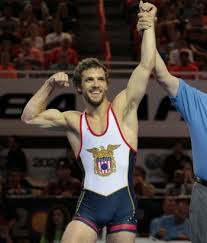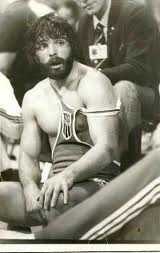“Don’t judge me†defiant Parker Humphrey declares from his twitter account, @parkerhump14kg. At two years old, Parker may be thought by many to be too young to be an active tweeter, but defying convention has become a time honored Humphrey tradition. Indeed, with his healthily distended little belly he is right to contest the scorn of those who might disapprove of his dual fisted attack on two ice cream cones at once. The literal translation of Parker’s protest might in fact be a warning, “Dad, you do things your way, I’ll do mine my way!â€
A fitting admonition indeed to a man wending his way through the madness of life at the top of the world’s most demanding sport, wrestling. The last vision of Reece Humphrey in competition was the backflip completion of an effortless double flip immediately after winning his second US National Title in Stillwater Oklahoma, in June 2013. In fact, little has been conventional about Humphrey’s journey to the top but no wrestler goes about his business with more genuine youthful exuberance than Buckeye Nation’s own Mr. Humphrey.
Parker’s granddad, Buckeye Jim Humphrey from Coshocton, Ohio, was himself a remarkably talented wrestler, having been a five time national freestyle champion, world silver medalist and Olympic alternate (unfortunately that was the 1980 Olympic team—which was denied the opportunity to compete in Moscow as part of President Carter’s boycott because of Soviet interference in Afghanistan).
Although it would be natural to think Jim would have tutored Reece in wrestling from a very early age, Reece declares he had no inkling of his father’s success until after he took up wrestling himself. Reece got into wrestling in the sixth grade, which is quite late for a guy who has enjoyed the exalted view from where Reece has, and then only because his older brother Jordin stumbled into it. Reece recalls being at an instructional camp and seeing his dad show up to help teach and can be excused for thinking, as he did, “what the heck is he doing, he doesn’t know anything about wrestling.†Looking at Jim’s old photos from the early 70s Reece might have confused his dad with singers Jim Croce or Cat Stevens more than Dan Gable–busting out with “Time In a Bottle†must have seemed far more appropriate to Reece than his dad walking through the mechanics a high crotch takedown.In some respects, Reece’s very success seems unconventional in the eyes of national writers and fans, who somehow incomprehensively seem almost surprised to find him at the top of a podium. The public mindset often establishes a peculiarized test of legitimacy that in wrestling is often based on NCAA titles—much like the basketball world tests its superstars on the basis of NBA titles won. Reece, like his father before him, had a great career at Ohio State but also like his father never won an NCAA title, though each acquitted himself with very high distinction. In 2009 Reece finished second at 133, losing a close 6-5 match to heated rival Franklin Gomez of Michigan State and in 2010, he finished third at 141 after having had the misfortune to meet freshman Kyle Dake in the semifinals as Dake was at the beginning of his historic run to four NCAA titles in four different weight classes.
So it was a surprise and indeed an upset to many when Reece defeated all comers, of any age, to become the 2011 national champion and world team representative (after placing fourth in the 2010 NCAA 141 pound weight class, Reece dropped to the 60 kilo weight class in 2011, which is 132 pounds). After his unfortunate loss in the 2012 Olympic trials, the temptation was to label the 2011 win an aberration. (In truth the only “fluke†was the bizarre match scoring and overtime rules then in existence which in the event of any tied two minute period, resorted to a purely random “ball drop†to start the ball drop winner in a superior position that resulted in a sudden victory “win†90 percent of the time. Reece was twice victimized by that rule in a 2012 wrestle-off with former Oklahoma State Cowboy Coleman Scott who parlayed his two out of three period win against Reece into a face-off where he beat Shawn Bunch for the 60 kilo US Olympic spot. Disregarding the randomness of the ball drop the only person to actually win a period by conventional means in the Scott/Humphrey match—indeed the only person to score an actual point in the match—was Reece Humphrey). The 2013 win, now his second in three years, should now remove whatever doubts might have lingered as to Reece’s legitimacy as champion of the 60 kilo weight class.
But Reece Humphrey, now 26, is chasing an Olympic and world title and as such is again an underdog. His showings on the world stage have not been overpowering to date and he recently lost in disappointing fashion to his Iranian counterpart in the “Rumble on the Rails†at Grand Central Station in New York (also under the old rules). Nonetheless, a ninth place finish in Turkey (where the ball drop was yet again a factor in a quarterfinal loss to Didier Pais of France) in 2011 is no small achievement, and one could note that Scott, the 2012 Olympic qualifier who went on to finish second to Humphrey in the 2013 US Open, earned a bronze medal in 2012. A world title is well within Humphrey’s reach.
Reece believes his body is up to the challenge, which now must span three years if it is to culminate in a spot on the Olympic team in Brazil in 2016. He believes he has learned to train smarter and to avoid injury. And he believes he has gotten much better at managing his weight in a consistent manner that will leave him better prepared at match time. Indeed, for dietary and to some extent training matters, he borrows select pages from the all-out assault on life practiced by long-time friend and teammate JD Bergman. JD’s “dietâ€, which JD does not describe as such—instead calling it part of an overall change in lifestyle—eschews most grains, breads, sugars, processed foods and seeks out as much raw and organic food as possible—one goal being to burn body fat not merely sugar.
One also suspects that if he is to achieve success on a world stage, Reece will in fact continue along his own unconventional past. Reece Humphrey is a remarkably aware and thoughtful person. As an illuminating example, when asked what he might do after wrestling, he rotely goes through a laundry list that includes coaching, establishing a career sustaining wrestling club and sales positions within the sports and wrestling business. When specifically asked he admits to how much he would love to get involved in MMA fighting, but quickly dismisses it out of family objection. But the prospect that really lights him up is the intellectual tight rope world of high stakes professional poker!
So there is a familiar arc of success at work that has guided him from latecomer to twice national champion and seems at work again as he plots out his final three years in the arena, and perhaps beyond—the proven ability to out-think the rest of the world. “Yes, I had a successful wrestling father who is a big reason for my success—but that did not help me get started earlier and in fact I started very late, so to a big extent that was not an advantage, and beside lots of wrestlers have knowledgeable fathers who helped them along the way. And yes, I work hard, but really it is pretty difficult to outwork the best—we are all working very hard. What I have always done is to focus as much as I can on what I have done, what works and what has not worked, what works for someone else and how he can be attacked. The mental aspect of wrestling is how I have tried to differentiate myself and has been really what has helped me make up any gap I have ever felt.â€
Wrestlers are commonly thought to be brutes, and the mere connotation of brutishness de-emphasizes the possibility that extreme mental acuity is required. But much like offensive linemen, the truth is that few endeavors require so much mental ability and quickness—and under extreme and violent circumstances. For every move there is a counter, for every counter there is a counter and at the highest level it is the mind that can think ahead and execute most crisply and decisively that prevails. Wrestling can be compared to trying to do a Rubic’s cube while being jostled in traffic—figure it out fast or get run over.
Any time he has faced a roadblock, Reece has fallen back on intensive study and devotion to understand what it takes at a very precise level to move past the roadblock. That formula has worked extremely well in the past and shows every sign that it continues to lead the way to success.
But Reece’s personal arc of success contains another critical constant. Reece had the fortune of having a mentor in his father who was wise enough to let Reece discover his own passion and gave Reece the space to figure out how to move that passion forward in a way that worked for Reece. While Reece may have come to wrestling late, he came to it honestly as it became his dream first, not his father’s. And then he had the benefit of a father who never pushed him to the point of burning out. Now, as an adult, his principal life relationship is with wife Meredith, also a Buckeye. If you ask Reece what is unique about him that you cannot read somewhere, he answers simply, “Meredith.â€
This of course resembles a cliché, except that as you put it all together, you realize how truly significant and apt it is in the specific case of Reece Humphrey. Meredith, perhaps without intending to, seems to push buttons in the precisely same correct and supportive way as father Jim once did. Dreams of achievement are funny things—they can choke people and strain relationships and they can devastate people if not achieved. People handle them in different ways, achieve them in different ways, fail to achieve them in different ways and deal with the consequences of success or failure in different ways. Somehow the consistent theme of those principally involved in the intersection of their lives and Reece’s athletic chase has been how they have complemented him and nurtured him; how all involved have put those important yet personal and unpredictable dreams in context as still smaller than a life being lived and still smaller than a relationship among loved ones; and how all have still given honor to the dreams of just the one of them and given those dreams the necessary devotion or space as and when needed. It is an intricate and delicate equation that most don’t fully solve over time, especially given the youthful and fragile stage at which athletic dreams generally must be fulfilled. And because it is a process that does in fact arc over a good portion of life and responsibility gets shifted from person to person, like father to wife, it is a process that is so prone to breaking down.
So when Reece Humphrey says he owes everything right now to his wife, he is not speaking in cliché, but rather what he is saying, from the heart, is that father, son, wife and all have gotten through the most demanding transitions of this phase of a life with big and immensely hard dreams. As he was once in the hands of a wise and respectful mentor, he is now in the embrace of a wise and respectful partner, and as to their parts, father and wife have achieved a flawless passing of the baton. Of course dad is still involved—he was in Reece’s corner in the conclusive match in Stillwater, insisting on a video review for which Reece had no patience (he was still ahead and in typical youthful fashion, just wanted to get on with things) and the review resulted in a technical fall (win by seven points or more) to end the match right there in Reece’s favor. The point is, Meredith has taken over as life partner and dad has given up that role to remain as coach—an amazingly hard transition in the most average of circumstances and yet it has taken place successfully while witnessing the highest level of athletic achievement.
We can all be confident, that as the times arise, young Parker is not in fact judged but instead is and will be given the opportunity to choose his dreams and the support to fulfill them—because that is the unconventional Humphrey way.





Great post Garth… I really enjoy your writings. Keep up the great work.
SYR, cannot tell you how much I appreciate that. Watch out for Friday and Monday. Where football and wrestling co-exist.
Nice I am excited …. You should try to do a where are they now with former OSU DLman Tim Anderson who was also a 4 time state wrestling champ interview/post.
It took me a couple of days to finally carve out time to read this, and I’m glad I took my time. Stories like this are inspiring. I can only imagine what it’s like to perform and compete at such a high level. This is a bit of a glimpse into what that is like.
(also, I love that they all use their weight class in their twitter handles. Nice touch)
I am from New Zealand and stayed with Jim in 1981 And would like to get in touch with him. Can you please send me his email address to me via my email many thanks. barry@allwest.co.nz